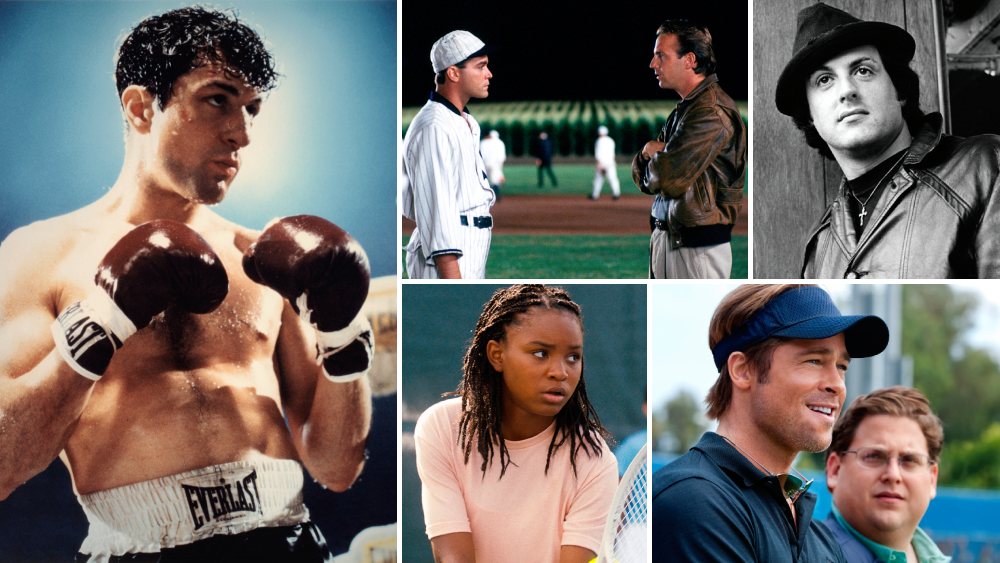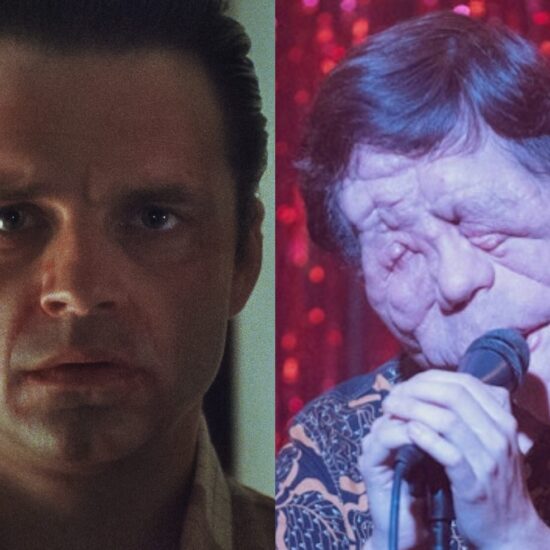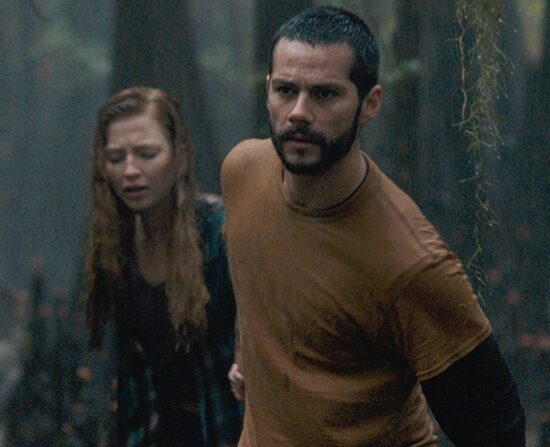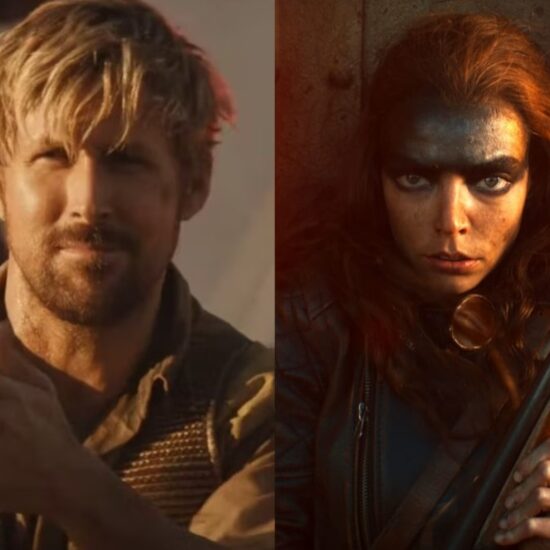
The Oscars love a sprawling biopic, an underdog character and a triumphant tale marred by obstacles and resulting in success. Those themes have marked the sports genre since the creation of cinema. In the Academy Awards’ history, 591 movies have been nominated for best picture, with 95 winners named among them. Depending on the definition of what qualifies as a “sports movie,” 17 films focusing on sports have been nominated, with three being handed the coveted statuette.
In celebration of Ben Affleck’s sports drama “Air,” which tells the story of the Nike corporation’s determined pursuit to sign rookie basketball player Michael Jordan, Variety is ranking the 17 sports films that have been nominated for best picture (which “Air” could potentially join in 2024).
According to the World Sports Encyclopedia, more than 8,000 different sports recordings have been catalogued. Any one of them could inspire a filmmaker. It’s arguable whether “sports” is its own genre, since it can be a backdrop for many types of narratives. But inspiration is universal.
Boxing movies have always felt like their own separate entity from the standard sports movies. The most audience-friendly and awards successful sport in film, boxing films often follow the same trope, “It’s about the fight both inside and outside the ring.” (See Heidi Gardner’s hilarious “Saturday Night Live” sketch as Angel, every boxer’s girlfriend from every movie about boxing ever).
The Academy has ignored some of the best sports movies. Notable snubs and worthy entrants include the delightful women’s baseball comedy “A League of Their Own” (1992) from Penny Marshall, and the criminally underappreciated debut film from Gina Prince-Bythewood, “Love & Basketball” (2000). Even the coming-of-age documentary feature “Hoop Dreams” (1994) from Steve James was infamously overlooked in its category, while the supremely popular “Hoosiers” (1986) went sadly unnoticed.
Ben Affleck as Phil Knight in “Air” (Amazon Studios)
Courtesy of Prime
“Air” stars Matt Damon, Ben Affleck, Chris Messina, Chris Tucker and Viola Davis. The Amazon Studios film is now playing in theaters before moving to Prime Video.
Read Variety’s ranking of the 17 sports movies below.
-
The Blind Side (2009)

Image Credit: ©Warner Bros/Courtesy Everett Collection Nominated producer(s): Gil Netter, Andrew A. Kosove, Broderick Johnson
Director: John Lee Hancock
Starring: Sandra Bullock, Tim McGraw, Quinton Aaron, Lily Collins, Jae Head, Kim Dickens, Kathy Bates
Studio: Warner Bros.Other Oscar noms/wins: best actress (Sandra Bullock, winner)
Sandra Bullock has been a star since the ‘80s, headlining box office hits like “Speed” (1993) and “While You Were Sleeping” (1996), yet we never really thought the Academy would feel inclined to reward her.
Then came “The Blind Side” where Bullock plays Leigh Anne Tuohy, who along with her family, becomes the “white savior” to the poor Black kid in John Lee Hancock’s story of real-life NFL first-round draft pick and All-American Michael Oher.
The movie didn’t exactly rack up passionate reviews, but making money can do wonders for your Oscar campaign. Not to mention that football was front-and-center during that part of the awards season.
Its shocking best picture nom clearly came along with Bullock’s eventual best actress win and pushed out more deserving films such as “Fantastic Mr. Fox,” “The Messenger” and “Star Trek.”
Nonetheless, the most deserving film did win – Kathryn Bigelow’s history-making “The Hurt Locker.” Either way, I’ll always love Sandy.
-
Seabiscuit (2003)

Image Credit: ©Universal/Courtesy Everett Collection Nominated producer(s): Kathleen Kennedy, Frank Marshall, Gary Ross
Director: Gary Ross
Starring: Tobey Maguire, Jeff Bridges, Chris Cooper, Elizabeth Banks, Gary Stevens, William H. Macy
Studio: Universal PicturesOther Oscar noms/wins: adapted screenplay (Gary Ross), production design (Jeannine Oppewall, Leslie Pope), cinematography (John Schwartzman), costume design (Judianna Makovsky), film editing (William Goldenberg), sound mixing (Andy Nelson, Anna Behlmer, Tod A. Maitland)
Director Gary Ross, in his pre-Hunger Games era, delivers a paint-by-numbers tale of horse-racing during the Great Depression. Perhaps in the same boat as best picture winner “Chariots of Fire” (1981), the movie has been mostly forgotten, but that’s due to feeling very much stuck in its time. During the early aughts, it was typical to see studios angling for awards attention with a softball such as “Seabiscuit,” which grossed over $140 million.
With a recent revisit, I found myself engaged once again, with a killer performance from Jeff Bridges, and recalling how during that awards season, William H. Macy managed to land a Globe nod as the fast-talking commentator and Chris Cooper picked up a SAG mention as the wise horse trainer. Nothing for Bridges or star Tobey Maguire.
-
Chariots of Fire (1981)

Image Credit: ©20thCentFox/Courtesy Everett Collection Nominated producer(s): David Puttnam (winner)
Director: Hugh Hudson
Starring: Ben Cross, Ian Charleson, Nigel Havers, Cheryl Campbell, Alice Krige, Lindsay Anderson, Dennis Christopher, Nigel Davenport, Brad Davis, Peter Egan, John Gielgud, Ian Holm, Patrick Magee
Studio: 20th Century FoxOther Oscar noms/wins: director, supporting actor (Ian Holm), adapted screenplay (Colin Welland, winner), costume design (Milena Canonero, winner), film editing (Terry Rawlings), original score (Vangelis, winner)
People will typically mention the score of “Chariots of Fire” before talking about anything else these days. That’s mostly because the movie is one of the least talked-about winners, and it doesn’t stand out as a bad film, it was a cinematic year that gave the world far more memorable movies like “Raiders of the Lost Ark” and “Reds.”
The story of two British track runners during the 1924 Olympics marked the end of a five-year consecutive run of the Oscars nominating sports movies, but it ushered in one of the least memorable decades of best picture winners in the 80s.
-
Heaven Can Wait (1978)

Image Credit: ©Paramount/Courtesy Everett Collection / Everett Collection Nominated producer(s): Warren Beatty
Director: Warren Beatty, Buck Henry
Starring: Warren Beatty, Julie Christie, James Mason, Charles Grodin, Dyan Cannon, Buck Henry, Vincent Gardenia, Jack Warden
Studio: Paramount PicturesOther Oscar noms/wins: director, best actor (Warren Beatty), supporting actor (Jack Warden), supporting actress (Dyan Cannon), adapted screenplay (Elaine May, Warren Beatty), production design (Paul Sylbert, Edwin O’Donovan, George Gaines, winner), cinematography (William A. Fraker), original score (Dave Grusin)
It’s not too often we see the Oscars embrace screwball comedies, but they did with Warren Beatty and Buck Henry’s sports-fantasy dramedy about a Los Angeles Rams quarterback who’s mistakenly taken to heaven in his prime.
Co-written by Beatty and the fabulous Elaine May, the movie brings morally invigorating questions to the surface regarding mortality and our purpose here on Earth.
In another banger lineup of best picture nominees of the 1970s, the movie lost the award to “The Deer Hunter,” along with “An Unmarried Woman,” “Coming Home” and “Midnight Express.”
-
The Champ (1931)

Image Credit: Courtesy Everett Collection Nominated producer(s): None named
Director: King Vidor
Starring: Wallace Beery, Jackie Cooper, Irene Rich, Roscoe Ates
Studio: Metro-Goldwyn-MayerOther Oscar noms/wins: director, best actor (Berry, winner), original story (Frances Marion, winner)
The washed-up alcoholic boxer is played by the fine Walter Beery, whose career skyrocketed after its release, helped by his role in “Min and Bill” the same year. At the fifth Academy Awards ceremony, the best actor category resulted in the only tie in its history, with Beery and Fredric March from “Dr. Jekyll and Mr. Hyde” sharing the prize. Interestingly, March had received one vote more than Beery but Academy rules at that time considered such a close margin to be a tie. Under current Academy rules, dual awards are given only for exact ties.
Despite mixed reviews from critics, the movie found its way into the best picture lineup, losing to MGM’s “Grand Hotel,” the only film to win best picture with a sole nomination.
-
Ford v Ferrari (2019)

Image Credit: ©20thCentFox/Courtesy Everett Collection Nominated producer(s): Peter Chernin, Jenno Topping, James Mangold
Director: James Mangold
Starring: Matt Damon, Christian Bale, Jon Bernthal, Caitríona Balfe, Tracy Letts, Josh Lucas
Studio: 20th Century FoxOther Oscar noms/wins: film editing (Andrew Buckland and Michael McCusker, winners), sound mixing (Paul Massey, David Giammarco, Steven Morrow), sound editing (Donald Sylvester, winner)
It’s a known fact: James Mangold knows how to make a movie.
Shifting gears into the world of racing, the film tells the story of automotive designer Carroll Shelby and race car driver Ken Miles (played exquisitely by Christian Bale). The action-packed tale brings the highs and lows, creating a world in which the audience is too afraid to blink with fear they could miss something.
Also embedded within the well-crafted flick is Tracy Letts, who soars in his brief but memorable role as Henry Ford, who goes on a joyride to remember.
The history-making non-English winner “Parasite” beat the film by a mile.
-
The Fighter (2010)

Image Credit: ©Paramount/Courtesy Everett Collection Nominated producer(s): David Hoberman, Todd Lieberman, Mark Wahlberg
Director: David O. Russell
Starring: Mark Wahlberg, Christian Bale, Amy Adams, Melissa Leo, Jack McGee
Studio: Paramount PicturesOther Oscar noms/wins: director, supporting actor (Christian Bale, winner), supporting actress (Amy Adams), supporting actress (Melissa Leo, winner), film editing (Pamela Martin)
In what many consider to be the start of David O. Russell’s relentless pursuit to win an Oscar, after shepherding zany, offbeat comedies like “Flirting with Disaster” (1996) and “I Heart Huckabees” (2004), his take on the life of boxer Micky Ward (Mark Wahlberg) trying to escape the shadow of his troubled brother Dickie (Christian Bale) remains the strongest effort of his later films.
This is one of the few boxing movies where the fights outside the ring heavily outweigh the ones we view inside, such as Amy Adams taking on Micky’s sisters.
“The Fighter” will always hold a special place in my heart because it gave us one of history’s most thirsty awards campaigns (that paid off) — with “CONSIDER” with supporting actress winner Melissa Leo’s face plastered across ads.
“The Fighter” lost to another biopic, “The King’s Speech.”
-
Breaking Away (1979)

Image Credit: ©20thCentFox/Courtesy Everett Collection Nominated producer(s): Peter Yates
Director: Peter Yates
Starring: Dennis Christopher, Dennis Quaid, Daniel Stern, Jackie Earle Haley, Barbara Barrie, Paul Dooley, Robyn Douglass
Studio: 20th Century FoxOther Oscar noms/wins: director, supporting actress (Barbara Barrie), original screenplay (Steve Tesich, winner), original song score adaptation (Patrick Williams)
Peter Yates’ coming-of-age film about four teenagers from Indiana who use cycling to escape is a beautiful ode to childhood and the dreams we give up on.
Utilizing one of the best ensembles of actors of the 1970s, the movie’s foursome evinces raw and fearless talent, all leading up to a final race that goes down as one of the most exciting in cinema history.
“Breaking Away” lost to the family drama “Kramer vs. Kramer” starring Dustin Hoffman and Meryl Streep.
-
King Richard (2021)

Image Credit: ©Warner Bros/Courtesy Everett Collection Nominated producer(s): Tim White, Trevor White, Will Smith
Director: Reinaldo Marcus Green
Starring: Will Smith, Aunjanue Ellis, Saniyya Sidney, Demi Singleton, Tony Goldwyn, Jon Bernthal
Studio: Warner Bros.Other Oscar noms/wins: best actor (Will Smith, winner), supporting actress (Aunjanue Ellis), original screenplay (Zach Baylin), film editing (Pamela Martin) original song (“Be Alive” by Beyoncé and Dixson)
94th Oscars ceremony aside, Will Smith’s transformation into Richard Williams, the father of tennis superstars Venus and Serena Williams, is a luscious endeavor for the veteran actor and worthy of the statuette he won for his portrayal.
What adds to the film’s delight as it looks at the early days of training the eventual athletes is how director Reinaldo Marcus Green is unafraid to show Richard as a flawed man. It shows human behavior is not always black-and-white, and questionable actions can have the best intentions.
With a fierce acting ensemble including supporting actress nominee Aunjanue Ellis, newcomer Saniyya Sidney, and the hilarious Jon Bernthal, “King Richard” makes you feel alive, as Beyoncé says.
The film lost to the first streaming best picture winner, “CODA.”
-
Jerry Maguire (1996)

Image Credit: © TriStar Pictures/courtesy Everett Collection Nominated producer(s): James L. Brooks, Laurence Mark, Richard Sakai, Cameron Crowe
Director: Cameron Crowe
Starring: Tom Cruise, Cuba Gooding Jr., Renée Zellweger, Kelly Preston, Jerry O’Connell, Jay Mohr, Bonnie Hunt, Regina King
Studio: Sony PicturesOther Oscar noms/wins: best actor (Tom Cruise), supporting actor (Cuba Gooding Jr., winner), original screenplay (Cameron Crowe), film editing (Joe Hutshing)
Another movie with a memorable one-liner — “Show me the money.”
And that’s just what writer and director Cameron Crowe did for the studio, and the film’s star Tom Cruise, in this story of a sports agent who has a moral epiphany.
Part rom-com, and dude-bro-film, “Jerry Maguire” is unapologetic about trying to appeal to the masses, utilizing a couple of clichés, but never without sincerity as it walks us all through the tantalizing subject of football deals and games. It’s not surprising, considering one of the film’s producers is none other than James L. Brooks of “Terms of Endearment” (1983) and “As Good as It Gets” (1997), who knows how to create that balance.
However, there was no hope for the movie to topple the steamroller that was “The English Patient,” especially given it also shared the lineup with another classic comedy, “Fargo.”
-
Million Dollar Baby (2004)

Image Credit: ©Warner Bros/Courtesy Everett Collection Nominated producer(s): Clint Eastwood, Albert S. Ruddy, Tom Rosenberg (winner)
Director: Clint Eastwood
Starring: Clint Eastwood, Hilary Swank, Morgan Freeman, Jay Baruchel, Mike Colter, Anthony Mackie, Margo Martindale
Studio: Warner Bros.Other Oscar noms/wins: director (winner), best actor (Clint Eastwood), best actress (Hilary Swank, winner), supporting actor (Morgan Freeman, winner), adapted screenplay (Paul Haggis), film editing (Joel Cox)
Clint Eastwood’s boxing drama has been a legacy since its Oscar win for best picture, dropping in at the last second of its awards season. And then, it turned the narrative around from what many assumed was going to be the long-awaited winning year for Martin Scorsese for “The Aviator” to a second triumphant win for Eastwood, as well as Hilary Swank.
In Eastwood’s signature style, the movie about an energetic female boxer who captures the heart of her hardened trainer is his “most shadow-y” movie ever. Nonetheless, it does its job exquisitely, featuring what I believe to be Eastwood’s finest acting moments, and introduces the world to the talents of Anthony Mackie.
-
The Pride of the Yankees (1942)

Image Credit: Courtesy Everett Collection Nominated producer(s): Samuel Goldwyn Productions
Director: Sam Wood
Starring: Gary Cooper, Teresa Wright, Babe Ruth, Walter Brennan
Studio: RKO Radio PicturesOther Oscar noms/wins: best actor (Gary Cooper), best actress (Teresa Wright), original story (Paul Gallico), screenplay (Herman J. Mankiewicz, Jo Swerling), art direction-interior decoration black-and-white (Perry Ferguson, Howard Bristol), cinematography black-and-white (Rudolph Maté), film editing (Daniel Mandell, winner), sound recording (Thomas T. Moulton), special effects (Jack Cosgrove, Ray Binger, Thomas T. Moulton), music scoring of a dramatic or comedy picture (Leigh Harline)
America’s favorite pastime has a special place in our hearts, and there have been heroes to emerge from it such as New York Yankees first baseman Lou Gehrig. Released one year after Gehrig’s death from Amyotrophic lateral sclerosis (better known as “Lou Gehrig’s disease”), the baseball film is a wonderful tribute with sensational performances by Gary Cooper as the MLB player and Teresa Wright as his wife Eleanor.
Delivering one of the most essential scenes in film history, Cooper’s retirement speech on the Yankee Stadium diamond sets off the waterworks in a profound way.
The film lost the Oscar top prize to William Wyler’s “Mrs. Miniver.”
-
The Hustler (1961)

Image Credit: ©20thCentFox/Courtesy Everett Collection Nominated producer(s): Robert Rossen
Director: Robert Rossen
Starring: Paul Newman, Piper Laurie, George C. Scott, Jackie Gleason, Myron McCormick
Studio: 20th Century FoxOther Oscar noms/wins: director, best actor (Paul Newman), best actress (Piper Laurie), supporting actor (Jackie Gleason, George C. Scott), adapted screenplay (Sidney Carroll, Robert Rossen), art direction black-and-white (Harry Horner, Gene Callahan, winner), cinematography black-and-white (Eugen Schufftan, winner)
It’s not clear whether it’s common knowledge to younger cinephiles that Paul Newman’s Oscar-winning performance in Martin Scorsese’s “The Color of Money” (1986) is a sequel to Robert Rossen’s classic in which Newman originated the role of professional pool player Eddie Felson.
Many consider the film to be one of Newman’s finest acting endeavors, as well as his co-star Jackie Gleason’s. But the film’s ruthless approach to its story and characters doesn’t rest upon the question of whether who wins or loses. Rather, it’s all about the fixation on Eddie, and how his choices affect the viewer’s feelings about him.
At the Oscars, the movie was steamrolled by Robert Wise and Jerome Robbins’ adaptation of the musical “West Side Story.” “The Hustler” was able to pick up its two wins because it was during a time the Academy was dividing some of the technical races between black-and-white and color pictures.
-
Field of Dreams (1989)

Image Credit: ©Universal/Courtesy Everett Collection Nominated producer(s): Lawrence Gordon, Charles Gordon
Director: Phil Alden Robinson
Starring: Kevin Costner, Amy Madigan, James Earl Jones, Ray Liotta, Burt Lancaster
Studio: Universal PicturesOther Oscar noms/wins: adapted screenplay (Phil Alden Robinson), original score (James Horner)
“If you build it, he will come.”
It’s not too often a movie line ripples throughout history, especially for a film that was released over 35 years ago. Phil Alden Robinson’s classic baseball movie had star Kevin Costner in his prime, playing Ray Kinsella, a man who hears a voice in his head telling him to build a baseball field.
What follows is a whimsical tale that leads to one of the biggest tearjerker scenes in a Dad movie of all time – when Ray reunites with his father and asks him, “You wanna have a catch?”
Alongside a lineup of masterful best picture nominees — “Born on the Fourth of July,” “Dead Poets Society” and “My Left Foot” — the lot lost out to the forgettable comedy “Driving Miss Daisy.”
-
Moneyball (2011)

Image Credit: ©Columbia Pictures/Courtesy Everett Collection Nominated producer(s): Michael De Luca, Rachael Horovitz, Brad Pitt
Director: Bennett Miller
Starring: Brad Pitt, Jonah Hill, Philip Seymour Hoffman, Robin Wright, Chris Pratt, Stephen Bishop, Jack McGee
Studio: Sony PicturesOther Oscar noms/wins: best actor (Brad Pitt), supporting actor (Jonah Hill), adapted screenplay (Steven Zaillian, Aaron Sorkin, Stan Chervin), film editing (Christopher Tellefsen), sound mixing (Deb Adair, Ron Bochar, David Giammarco, Ed Novick)
Math is hard, but Bennett Miller’s vivacious look into the Oakland Athletics’ attempt to redefine baseball is a spectacle of story, with glorious performances from the Oscar-nominated Brad Pitt, Jonah Hill (who showed the world how good of an actor he can be) and the overlooked but always reliable Philip Seymour Hoffman.
With a whippersnapper of a script by Steven Zaillian, Aaron Sorkin and Stan Chervin, the Sony movie manages to keep the dialogue in laymen’s terms, never trying to say it’s smarter than the rest of us.
It almost plays out like a documentary feature, with some incredibly handsome subjects.
Unfortunately, the drama went home empty-handed, losing the final award to the silent movie, “The Artist.”
-
Raging Bull (1980)

Image Credit: ©United Artists/Courtesy Everett Collection Nominated producer(s): Irwin Winkler, Robert Chartoff
Director: Martin Scorsese
Starring: Robert DeNiro, Joe Pesci, Cathy Moriarty, Nicholas Colasanto
Studio: United ArtistsOther Oscar noms/wins: director, best actor (Robert DeNiro, winner), supporting actor (Joe Pesci), supporting actress (Cathy Moriarty), cinematography (Michael Chapman), film editing (Thelma Schoonmaker, winner), sound (Donald O. Mitchell, Bill Nicholson, David J. Kimball, Les Lazarowitz)
Before “Silence” (2016) came on the scene, the story of Jake LaMotta, a violent and ill-tempered boxer who destroys his life both in and outside of the ring, was the definitive movie by master auteur Martin Scorsese.
Written by Paul Schrader and Mardik Martin (criminally snubbed for adapted screenplay), Scorsese uses monochromatic palettes and the career-defining roles of his stars to paint a dark, but enlivened portrait of regret and redemption.
The movie was edged out in the top race by Robert Redford’s “Ordinary People.”
-
Rocky (1976)

Image Credit: Courtesy Everett Collection Nominated producer(s): Irwin Winkler, Robert Chartoff (winners)
Director: John G. Avildsen
Starring: Sylvester Stallone, Talia Shire, Burt Young, Carl Weathers, Burgess Meredith
Studio: United ArtistsOther Oscar noms/wins: director (winner), best actor (Sylvester Stallone), best actress (Talia Shire), supporting actor (Burgess Meredith, Burt Young), original screenplay (Stallone), film editing (Richard Halsey and Scott Conrad, winner), sound (Harry W. Tetrick, William L. McCaughey, Lyle J. Burbridge, Bud Alper), original song (“Gonna Fly Now” by Bill Conti, Carol Connors, Ayn Robbins)
Everyone has heard some version of the story of a grandparent, parent or sibling going to the movie theater and watching “Rocky” for the very first time. It often ends with the narrator waking up the next morning, drinking a raw egg, and going for an early morning run, and never attempting that ever again.
In what can be categorized as one of the top five finest best picture lineups of all-time, the underdog story of boxer Rocky Balboa manifested itself in real life, beating out “All the President’s Men,” “Bound for Glory,” “Network” and “Taxi Driver.” It would have been fascinating to cover that dynamite year as an awards pundit and then watch the telecast and not know what would win the final category of the night – especially coming after “Network” won three acting awards and original screenplay, and “All the President’s Men” had tied for the most statuettes with four including supporting actor and adapted screenplay.
Nonetheless, the DGA-winning “Rocky” prevailed and has since been considered one of the defining sports movies in history. Watching TV spots and trailers of the era, it’s fascinating to hear Stallone compared to the likes of Marlon Brando, Paul Newman, Al Pacino and Robert DeNiro.
They weren’t aware of the sequels that would follow.














